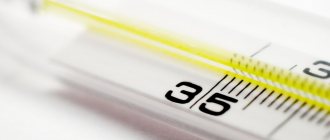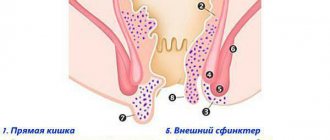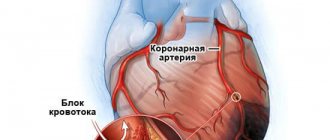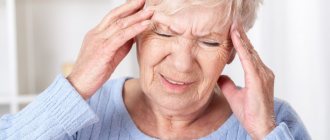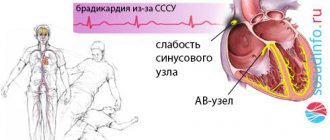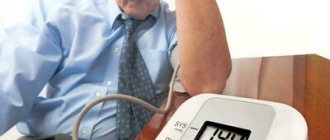Arterial hypotension. Causes
The cause of persistent low blood pressure may be a person’s congenital constitutional characteristics:
- asthenia;
- disruption of connective tissue formation (dysplasia);
- neuroendocrine imbalance (the consequence of which is disruption of blood circulation regulation).
In this case, they talk about essential (or primary) arterial hypotension.
An acquired decrease in blood pressure, which can be constant or paroxysmal, is usually a consequence or concomitant pathology of a number of other diseases:
- endocrine disorders (diabetes mellitus, hypothyroidism, adrenal insufficiency);
- infectious and tumor diseases, resulting in anemia and cachexia (exhaustion);
- diseases of the nervous system;
- chronic fatigue syndrome;
- amyloidosis;
- heart ailments;
- side effects of medications, etc.
A sharp decrease in blood pressure, even to the point of fainting, may have its own characteristic trigger factors:
- eating;
- transition from horizontal to vertical position;
- emotional and physical overload (although usually in response to them, pressure, on the contrary, increases);
- night sleep.
In psychosomatics, manifestations of hypotension are considered as a consequence of insufficient life tension, pressure, and passive tactics of avoiding emerging difficulties and obstacles instead of actively resolving them.
Is it so scary and does it need to be treated?
- In the generally accepted sense, hypotension is if the tonometer shows you numbers below 90\60 mmHg. But everyone has their own blood pressure standards and there is no need to “treat the numbers” if there are no complaints.
- Sometimes low blood pressure can still mean that the brain and other vital organs are suffering from a lack of blood flow. What symptoms may appear?
- Dizziness, feeling of unsteadiness
- Sudden loss of consciousness
- Foggy, blurred vision
- Changes in heart rate
- Nausea (no vomiting!)
- General weakness, difficulty concentrating
Arterial hypotension. Symptoms
A sharp drop in blood pressure under the influence of the above triggering factors has characteristic manifestations:
- instability;
- weakness;
- nausea and dizziness;
- heartbeat;
- feeling of "cotton legs"
- visual and speech impairments;
- psycho-emotional experiences of anxiety and fear;
- fainting.
Chronic arterial hypotension (both primary and acquired) is expressed in:
- headache and dizziness;
- palpitations, shortness of breath during physical and emotional stress
- chronic fatigue and high fatigue;
- sleep disorders;
- unsteadiness when walking;
- feeling hot or cold, sweating, numbness;
- deterioration of memory and attention;
- poor tolerance to stuffiness, heat, transport, heights;
- frequent fainting.
Drinks based on medicinal herbs
Ivan tea for hypotension or fireweed is an assistant and friend for such a condition. Essential oils, trace elements and amino acids that are included in the medicinal plant exceed the composition of sea kale.
Beneficial features:
- relieves drowsiness and gives vigor;
- increases blood pressure;
- contains a large amount of vitamin C;
- serves as a general strengthening agent;
- increases immunity.
To use, you need to pour 2 tbsp. herbs 400 ml hot water, but do not boil. Let stand for 30 minutes.
Monastery tea is also useful for hypotension. The origin of the name “monastic” is interesting. There is an assumption that the creators of this drink were the monks of the Solovetsky Islands who lived in the monastery. Therefore, the collection of medicinal herbs received such a name.
The collection includes several types of medicinal plants: chamomile and meadowsweet, rose hips and St. John's wort, oregano and hawthorn, thyme and eucalyptus, black currant.
Beneficial features:
- removes excess fluid from the body and serves as a diuretic;
- normalizes the activity of the heart muscle;
- increases blood pressure;
- strengthens the immune system.
The daily consumption rate is 4 glasses. The recipe is absolutely simple: 1 tsp. pour a glass of boiling water and let stand for 10 - 15 minutes.
Arterial hypotension in children
A persistent decrease in blood pressure in childhood may be asymptomatic and reflect compensated physiological features. But much more often, this condition affects the quality of life, resulting in increased fatigue, low performance, poor attention and ability to concentrate (which affects interest in learning new things), weather sensitivity, etc. And in general it forms an asthenic psychophysiological type. Often in this case, the child is diagnosed with “neurocirculatory dystonia” or “vegetative-vascular dystonia” of the hypotensive type.
In adulthood, there is a risk of this disease transitioning into a phase of persistent increase in blood pressure and a number of complications from the cardiovascular system.
Let's look at the possible causes of low blood pressure.
Many daily non-pathological (!) factors lead to a decrease in this indicator:
- Usually in the morning the pressure is lower than in the evening, and it can vary within 30-40 units and this is normal.
- If you are pregnant, your blood pressure may be low due to blood redistribution
- If you stand on your feet for a long time or, conversely, lie in bed for a very long time (this is especially noticeable in those who have been on long-term bed rest), the pressure will decrease due, again, to the redistribution of blood and its stagnation in the lower extremities
- If you are frozen, your pulse slows down and your blood pressure drops.
- Hypotension due to a sudden change in body position, or postural (for example, quickly jumping out of bed or abruptly getting up from the sofa). This is accompanied by dizziness, darkening of the eyes, tinnitus, general weakness, and sometimes fainting and goes away within a few minutes. It may also occur for the first time and more often in old age due to the fact that the elasticity of the vascular wall is lost with age. In addition, it can also occur after intense physical activity.
- Hypotension after eating (or postprandial). Yes, yes, after eating! The thing is. that after a hearty, hearty lunch or dinner, a large amount of blood flows to the digestive organs so that food is digested faster. Blood is redistributed in the body, the pulse quickens and blood pressure may drop. Mostly, such conditions occur in older people, especially those with hypertension, people with Parkinson's disease and diabetes.
- If you are taking certain medications, for example, to treat hypertension, some antidepressants, muscle relaxants. Never self-medicate!
- Some researchers believe that low blood pressure is genetically determined. If your parents have hypotension, it is likely that you have inherited this feature.
Arterial hypotension. Treatment
Standard treatment of secondary hypotension involves treatment of underlying diseases and compensation for disorders of the cardiovascular system. Particular attention should be paid to the selection and dosage of medications that can cause a decrease in blood pressure.
In the treatment of primary hypotension, priority is given to non-drug methods: physical exercise (swimming, walking), massage, correction of daily routine and nutrition, position during work and sleep. Patients diagnosed with “neurocirculatory dystonia” or “vegetative-vascular dystonia” of the hypotensive type are called people with a “narrow comfort zone”, for whom it is vital to find their own individual rhythm of life and, if possible, to go beyond it as little as possible.
Arterial hypotension is a systemic health disorder. And in its treatment, holistic methods with an individual approach to a person can be successfully applied - acupuncture, homeopathy, osteopathy, herbal medicine.
Within the framework of the psychosomatic approach, the most important component of the treatment of hypotension is the activity of the patient himself. The main thing for a person is to want and be able to achieve something, overcome it, implement it. Even following the doctor’s recommendations in itself has a healing effect, since it involves the free will and energy of the person himself.
Hypotension. What to do?
Everyone knows what hypertension and hypertensive crisis are. But less is known about hypotension - low blood pressure, although many suffer from hypotension.
Hypotonic disease is a condition of the body characterized by a decrease in arterial tone. This disease is characterized by a decrease in systo- logical pressure below 100 mmHg, and diastolic pressure below 60 mm. Hg Art.
Hypotension can be caused by nervous conditions; chronic fatigue caused by an imbalance in the ratio of hours of rest and work; depression and other apathetic and depressed states; some infections; diseases of the cardiovascular system; adrenal gland diseases; phlebeurysm.
Symptoms of hypotension
- general weakness;
- rapid fatigue during physical and mental stress;
- headaches, dizziness, chilliness of the extremities, tendency to faint;
- feeling of lack of air, insomnia;
- pain in the heart, heaviness in the stomach, loss of appetite;
- Often there are disturbances in stool (usually constipation), irregularities in the menstrual cycle in women and decreased potency in men.
Treatment of hypotension
Hypotension is a serious disease and you should not self-medicate here! The most commonly used and effective drugs in this case are ginseng, immortelle, hawthorn and eleutherococcus tinctures. These, like all drugs, affect each person differently, so any herb can cause a negative reaction and worsen your condition. The doctor you need to contact is a cardiologist, he will do a full examination, determine the cause and prescribe exactly the drugs that are suitable for you based on the history of all your previous diseases.
There are several options for dealing with low blood pressure. 1. Water. Hypotensive people need to drink 2-3 glasses more per day than you usually drink. This will allow you to feel at your level and maintain normal blood pressure. 2. Sleep. Rest should be about 9-10 hours. This amount of time will help you restore the energy you spent during the day. 3. Active recreation and walking. Movement is life. Play sports without heavy loads, but regularly. The best medicine is walking, swimming, outdoor games. All our movements improve blood circulation, it moves through the vessels, makes all the organs of the body work and therefore improves overall physical condition. 4. Shower. A contrast shower is very useful, as it improves the condition of blood vessels. Pouring cold water, bath, sauna, massage, etc. But the bath, as you know, is a serious matter and hypotensive people should approach it carefully and gradually. You can’t change the temperature frequently: from cold to hot. You may lose consciousness. 5. A person with low blood pressure should not get out of bed suddenly. A sudden rise can also cause loss of consciousness. 6. Massage and physical therapy for hypotension strengthen the body, improve the functioning of the cardiovascular, nervous (regulating blood circulation), muscular systems, metabolism, and help learn how to correctly alternate between relaxation and muscle contraction.
7. Nutrition for hypotension should be healthy, without special dietary restrictions, and include in the diet: vegetables, especially fresh green ones, in large quantities, whole grains, legumes, high-quality fats, sea fish, eggs, chicken, dairy products from goat milk, fruits, unroasted nuts and seeds.
With low blood pressure, a crisis can also develop - only a hypotonic one: this is a sharp decrease in blood pressure, which leads to insufficient blood supply to the brain, manifested by a sudden deterioration in a person’s condition: fainting, dizziness, weakness.
How to help the victim?
- The patient should be placed on a bed or other horizontal surface. Place a pillow or blanket under your shins; your legs should be slightly higher than your head. This leads to increased blood flow to the brain and rapid restoration of consciousness.
- Tight clothing should be loosened.
- It is very important to ensure a flow of fresh air into the room.
- Warm the patient by covering him with a warm blanket or blanket.
- Give the victim hot, sweet, strong tea, adding 10-15 drops of tincture of eleutherococcus, ginseng, Chinese lemongrass, pantocrine, zamanikha or other general tonic drugs.
- Measure blood pressure and record blood pressure readings and time. During the first hour, monitor the pressure every 15 minutes, then the interval can be increased to 30 minutes to an hour.
If blood pressure steadily decreases and the victim loses consciousness, call an ambulance. If the condition improves, you can limit yourself to calling a local therapist. Especially if this was the first such episode and the cause of hypotension is not yet clear.
The most reliable method of combating hypotension is still working together with a specialist. Therefore, there is nothing more reliable than scheduling a consultation with professionals.
Fedorova Lyubov Alekseevna – therapist, first category doctor, medical cardiologist.
Arterial hypotension. First aid
With the development of a hypotensive crisis and fainting, it is important:
- Place the person in the feet-over-head position. If this happens in transport and there is nowhere to put it, you can lower your head down below your knees.
- Unbutton your clothes and, if possible, provide access to fresh air.
- If the person is conscious, calm him down and give him water to drink.
- You can rub your ears and massage the collar area and fingertips (the endings of many of the body’s energy channels are located here).
- In case of prolonged fainting, call an ambulance.
Make an appointment
Sudanese rose petals
Hibiscus tea for hypotension is a drink for real gourmets. It represents the petals of the Sudanese rose, which gives it a red color and a sour taste. The drink is good both hot and cold. The only question that remains controversial is whether to drink hot or cold tea for hypotension . Doctors recommend drinking this drink hot with added sugar.
Sudanese rose has the following beneficial qualities:
- increases immunity;
- has a rejuvenating effect;
- removes toxins from the body;
- stabilizes blood pressure.
Method of preparation: 1 tsp. pour rose petals into a glass of hot water. Let it brew for 5 minutes.
Scientists have come to the conclusion that hibiscus in large quantities reduces blood pressure, so hypotensive people should not get carried away with this drink. The recommended amount of drinking Sudanese rose drink is 1 glass per day.
How to increase low blood pressure with folk remedies
There are many simple ways to quickly increase low blood pressure using folk remedies.
- take a contrast shower;
- drink a cup of coffee or sweet strong tea;
- drink a few glasses of water;
- massage your feet and temples clockwise for 2-3 minutes.
Buy Eleutherococcus (root) on our website
These folk remedies for low blood pressure are good if there is a sharp drop in levels. And to achieve a mild and persistent increase in blood pressure, 5 medicinal herbs will help:
- tansy;
- lemongrass;
- ginseng;
- Eleutherococcus;
- Bay leaf.
In addition, for low blood pressure, cinnamon, dark chocolate, and green tea are suitable for treatment with folk remedies.
Treatment of low blood pressure in women with folk remedies
The fair sex suffers from hypotension, subjecting themselves to diets and intense physical activity, trying to meet beauty standards, or during pregnancy or menopause. Whatever the symptoms and causes of low blood pressure in women, treatment should include the use of folk remedies.
The most popular treatment for low blood pressure in women is flax seeds. They must be consumed on an empty stomach. The following products are also suitable for the fair sex:
- cinnamon decoction;
- essential oils of clove and rosemary;
- bitter chocolate;
- fireweed and green tea.
Worth remembering! You can raise your blood pressure if you buy the “Monastery Tea” collection. Clean vessels."

